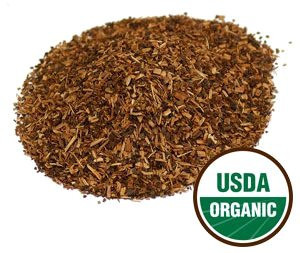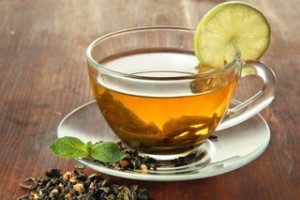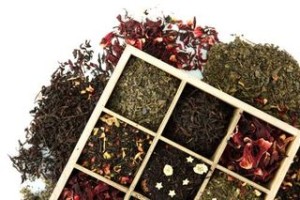Honeybush Tea
Table of Contents
NEWS: This superfood is now available in the SANEStore as a convenient whole-food powder so you can more easily enjoy it in smoothies and recipes.
Honeybush tea is a super fruity delight that is naturally sweet and remarkably ambrosial, yet is completely free of flavoring agents and other ingredients. This magnificent organic tea is imported from the Cape of Good Hope, South Africa. Naturally caffeine free, honeybush is a favorite among children. Try it iced!
This is a naturally caffeine free organic loose tea blend.

Why Try Honeybush Tea?
What are the health benefits of honeybush?
Honeybush tea may provide additional health benefits, including:
- Anti-obesity potential.
- Relief of menopausal symptoms.
- Immune system support.
- Alleviated respiratory symptoms.
Honeybush tea and anti-obesity potential
A human study reports that honeybush tea may be a promising option for people who want to lose weight. In this study, 47 obese volunteers took either 450 ml of herbal tea containing H. brasiliensis or a placebo every day for four weeks.
The participants were then assessed at the start and end of the period to determine their overall weight loss.
On average, those who consumed the honeybush had a 4-pound greater drop in body mass index (BMI) than those who did not have the tea. Honeybush tea and menopausal symptoms
In another study , 52 women with perimenopausal symptoms such as hot flashes and insomnia received either 900 mg/day of an ethanol extract from H. brasiliensis or a matching placebo for six weeks.
The women in the treatment group experienced significant improvements in menopausal symptoms, including sleeping well and feeling more refreshed when waking up in the morning.
Honeybush tea has also been shown to provide relief of insomnia due to menopause.
Honeybush tea and immune system support
An animal study suggests that H. brasiliensis may have immune-boosting properties. In this investigation, yeast cells were treated with an ethanol extract of H. brasiliensis leaves before being injected into mice that had suppressed immunity due to exposure to radiation or malnutrition .
The results showed that administering an H. brasiliensis extract reversed the negative impact on immunity by preventing changes commonly associated with impaired immunity. Honey bush tea and alleviated respiratory symptoms
A human clinical trial sought to determine the effect of honeybush extract on respiratory complaints due to colds .
Twenty adult volunteers each drank 75 ml of either a H. brasiliensis extract or placebo every day for two weeks.
At the end of the period, those in the treatment group experienced an average 25 percent improvement in their respiratory function, compared to only 6 percent in the placebo group. The researchers conclude that this herbal extract may provide benefits for people with respiratory ailments.
How to use Honeybush Tea?
The best way to take honeybush tea is as a hot beverage. The method outlined earlier in this article can be used, but another option is to place 4 teaspoonfuls of the leaves in a mug and pour boiling water over them. Allow it to steep for about 10 minutes before straining and drinking. The drink may be sweetened with sugar or honey if desired.
Honeybush tea side effects & cautions
As of now, there are no known side effects from consuming honeybush tea unless you have an allergy to plants in the Fabaceae family .
If you’re pregnant or breastfeeding, don’t use this herbal supplement without first consulting your physician because it hasn’t been sufficiently studied for safety during pregnancy and lactation.
Honeybush tea should not be consumed by individuals with glucose-6-phosphate dehydrogenase deficiency, a rare genetic disorder where the body can’t break down an organic compound called 6-phosphogluconate. This compound builds up in the red blood cells, which can cause severe anemia.
Moderate caffeine consumption is generally considered safe for most healthy adults, but excessive caffeine intake may pose health risks.
It’s best to limit yourself to no more than 400 mg of caffeine daily unless you have consulted your doctor. Caffeine present in honeybush tea may negatively impact sleep quality and quantity if consumed close to bedtime. The same caution applies to any other caffeinated beverage or herbal supplement containing caffeine .
Glycemic index & diabetes
The glycemic index (GI) is a measurement that indicates how quickly blood sugar levels respond to carbohydrates in food and drink .
Foods with low GI numbers are slowly digested and absorbed by the body, leading to gradual increases in blood sugar levels. Foods with high GIs create sharp peaks in blood glucose followed by steep drops.
Honeybush is considered low-GI containing 25–45 percent less carbs than black tea. This makes honeybush ideal for people with diabetes and prediabetes because it can help control blood sugar and insulin levels. It also makes honeybush a good choice for weight loss and management in this population.
Decaffeinated teas or herbal teas are naturally caffeine-free, but not all of them are decaffeinated through the use of water. Some companies use other chemicals to extract the caffeine from tea leaves, such as methylene chloride or ethyl acetate , which may leave chemical residues in the finished product .
When buying honeybush tea, make sure you know what method was used to remove the natural caffeine content before purchasing decaf tea; otherwise you risk ingesting residues that may be harmful.
Honey bush tea has been proven to have beneficial effects on respiratory ailments. It is also generally safe to drink and has a low glycemic index which makes it a good choice for individuals with diabetes or prediabetes .
Honeybush tea real case uses
al sought to determine the effect of honeybush extract on respiratory complaints due to colds .
Twenty adult volunteers each drank 75 ml of either a H. brasiliensis extract or placebo every day for two weeks.
At the end of the period, those in the treatment group experienced an average 25 percent improvement in their respiratory function, compared to only 6 percent in the placebo group. The researchers conclude that this herbal extract may provide benefits for people with respiratory ailments.
References
1. “Encyclopedia of Natural Medicine”; M. Murray and J. Pizzorno; 2008.
2. “Functional Biochemistry in Health and Disease”; Eric Newsholme et al; 2010.
3. “Natural Standard Herb & Supplement Reference: Evidence-based Clinical Reviews”; Catherine E. Ulbricht et al; 2005.
4. “The New Healing Herbs”; Michael Castleman; 2010.









